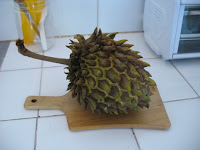Fruits of Change
 After a long hiatus, the blog is back, and I am back in Ecuador, this time to live. I’ve chosen Tena, a city in the Amazon jungle with a population of 16,000, as my home base. When I tell people, especially Ecuadorians, where I live, I get a wide range of reactions, from impressed amazement to bewildered disbelief. Even though five years ago I never would have imagined myself taking up residence in the jungle, it’s neither as adventurous or as dangerous as it might sound. My comfortable apartment has wood floors and cement walls and a patio overlooking the mature fruit trees and ornamental plants that the landlords planted years ago. On mornings when I don’t have meetings or community visits, I sit out there with my coffee and observe the butterflies at work. I can go a week without seeing the same kind twice. So when people ask, “Why Tena?” (or “Why Tena!”), here is what I tell them:
After a long hiatus, the blog is back, and I am back in Ecuador, this time to live. I’ve chosen Tena, a city in the Amazon jungle with a population of 16,000, as my home base. When I tell people, especially Ecuadorians, where I live, I get a wide range of reactions, from impressed amazement to bewildered disbelief. Even though five years ago I never would have imagined myself taking up residence in the jungle, it’s neither as adventurous or as dangerous as it might sound. My comfortable apartment has wood floors and cement walls and a patio overlooking the mature fruit trees and ornamental plants that the landlords planted years ago. On mornings when I don’t have meetings or community visits, I sit out there with my coffee and observe the butterflies at work. I can go a week without seeing the same kind twice. So when people ask, “Why Tena?” (or “Why Tena!”), here is what I tell them: Fruits that look like they come from outer space: I discovered the anona when my landlady picked one from the tree that grows outside in the yard and brought it to me as a welcome gift. Though I haven’t been in the habit of eating fruit that resembles a porcupine, the inside of an anona is gooey and sweet, like tapioca without the disgusting globules. It’s great in cakes, and I plan to try to make ice cream with it next.
Lazy birdwatching: Again, with my cup of coffee on the patio. No binoculars needed.
Inspiring neighbors: Visiting different Kichwa communities for Global Pediatric Alliance, I’ve met a lot of people with little formal education but excellent ideas: One group wants to build dry ecological toilets so they not only will they have sanitation for the first time, but the toilets won’t contaminate the groundwater and will produce completely safe organic compost for gardens. A friend of mine, a father of six who has not had steady work for almost a year, has decided to take a huge risk and go into business for himself, converting a plot of family land into an Kichwa ecolodge. Another friend of mine, who has some university education, presented me with a ten-page proposal to train Kichwa women and young people to be community leaders after I casually mentioned that someday it would be interesting to collaborate on that type of project.
Fewer distractions: Yes, I’ve got t.v. (but not cable) and yes, I’ve got internet (but no high-speed line in my home yet), and yes, my neighbors play salsa music or a compiliation of 80s American music that's a bestseller at the bootleg CD shops here, but despite all of that, I often find myself surrounded by quiet or the noises of nature. Somehow, having fewer things plugged into the wall or running on batteries, I find it it easier to read, write, and think.
Sunsets: After a long, hot day in Tena fighting with the phone company or standing in lines to pay my utility bills, I walk home through town, across the airport tarmac (since the only flights are occasional a government prop planes, at dusk it’s turned into a running track and volleyball court), and watch the sunset over the lush mountains of Llanganates Reserve. Although many, many thousands of trees have been cut down in this area, the forests in the park are still in tact. The sun sinking behind those mountains reminds me that my human clock and the concerns it drives are, at the end of the day, insignificant.
Labels: animals, environment, food, Kichwa

